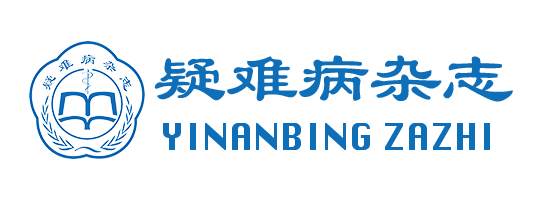-
 Glycogen storage disease type lb with repeated fever and hypoglycemia: a case report and literatures review
Glycogen storage disease type lb with repeated fever and hypoglycemia: a case report and literatures review
Author:Ren Xiaoya,Ding Yuan,Wang Qiao,Gong Chunxiu
keyword:Glycogen storage disease,type Ib;SCL37A4 gene mutation;Hypoglycemia;Diagnosis;Treatment
This paper reported a case of glycogen storage disease type Ib,and reviewed the literatures.
-
 Brain imaging features of glial spherical inclusion body Tau proteinopathy
Brain imaging features of glial spherical inclusion body Tau proteinopathy
Author:Fan Xueyi,Qian Hairong.
keyword: Glial spherical inclusion body Tau proteinopathy; Imaging; Diagnosis;
Glial globular inclusion body Tau proteinopathy(GGT) is a 4 R-Tau proteinopathy, which is rare. Its clinical manifestations and neuropathology are heterogeneous. It overlaps with Alzheimer's disease, frontotemporal dementia, progressive supranuclear palsy and other neurodegenerative diseases, and is difficult to diagnose. At present, it mainly depends on autopsy. Up to now, due to the limited number of documents that reported the imaging manifestations of GGT in detail, the understanding of imaging of GGT is mostly limited to the non-specific signs such as frontotemporal lobe atrophy and white matter hyperintensity. Therefore, the article reviews the imaging data of GGT cases reported in recent 5 years, extracts relatively specific imaging signs, and hopes to provide some reference value for clinical identification of GGT.
-
 Research progress of probiotics in the treatment of inflammatory bowel disease
Research progress of probiotics in the treatment of inflammatory bowel disease
Author:Yang Minqi,Zhang Jixiang,Dong Weiguo.
keyword:Inflammatory bowel disease; Intestinal flora; Probiotic; Therapy
Inflammatory bowel disease (IBD) is a chronic intestinal inflammatory disease involving environment, diet,genetics, intestinal flora and other factors. The incidence of IBD is gradually increasing in China, but the existing treatment methods such as aminosalicylic acid, glucocorticoid, immunosuppressant and biological agents have shortcomings such as high price, low safety, obvious adverse reactions and limited therapeutic effect. It has been found that probiotics have significant effects in regulating intestinal flora, reducing intestinal inflammatory response, regulating intestinal immunity, etc. This article reviews the relationship between intestinal flora and IBD, the clinical application of probiotics in the treatment of IBD and its mechanism.
-
 Mechanism and target of neutrophil extracellular trap net in sepsis
Mechanism and target of neutrophil extracellular trap net in sepsis
Author:Wang Hanli,Tian Yuan,Liang Qun.
keyword: Sepsis; Neutrophil extracellular traps; Immune function; Coagulation function; Endothelial injury;
Neutrophil extracellular entrapment nets(NETs) are a new kind of net chromatin structure that can kill pathogens, and they play an important role in the pathological process of sepsis. In the pathological process of sepsis, NETs may also cause inflammatory cascade reactions while killing pathogens, which may affect the coagulation function, and may also directly cause damage and leakage of vascular endothelium. This article reviews the mechanism of NETs in sepsis, the proven pathways and current interventions, and analyzes the possible future research directions. It is hoped that the discussion of NETs in sepsis will provide new ideas for the research and treatment of sepsis in the future.
-
 Research status of new stress urinary incontinence after pelvic organ prolapse surgery
Research status of new stress urinary incontinence after pelvic organ prolapse surgery
Author:Wang Dongsheng* ,Guo Jia- heng,Duan Yongfei,Yu Lei.
keyword: De novo stress urinary incontinence; Occult stress urinary incontinence; Pelvic organ prolapse; Stress urinary incontinence;
There are more and more patients with new stress urinary incontinence(SUI) after pelvic organ prolapse(POP) surgical repair, which affects the quality of life of patients. The occult SUI is closely related to the occurrence of new SUI. If it cannot be diagnosed in time before surgery, it will not only cause unnecessary disputes, but also increase the risk of new SUI after surgery. Preoperative stress test was used to screen occult SUI, and preventive anti incontinence surgery reduced the incidence of new SUI, but increased the burden of patients and adverse events. Whether prolapse repair should be combined with anti-incontinence surgery has always been controversial. This article reviews the research status of occult SUI and new SUI after POP, which are often ignored in the diagnosis and treatment process, to provide reference for the diagnosis and treatment of POP and SUI patients.

 Glycogen storage disease type lb with repeated fever and hypoglycemia: a case report and literatures review
Glycogen storage disease type lb with repeated fever and hypoglycemia: a case report and literatures review
 Brain imaging features of glial spherical inclusion body Tau proteinopathy
Brain imaging features of glial spherical inclusion body Tau proteinopathy
 Research progress of probiotics in the treatment of inflammatory bowel disease
Research progress of probiotics in the treatment of inflammatory bowel disease
 Mechanism and target of neutrophil extracellular trap net in sepsis
Mechanism and target of neutrophil extracellular trap net in sepsis
 Research status of new stress urinary incontinence after pelvic organ prolapse surgery
Research status of new stress urinary incontinence after pelvic organ prolapse surgery